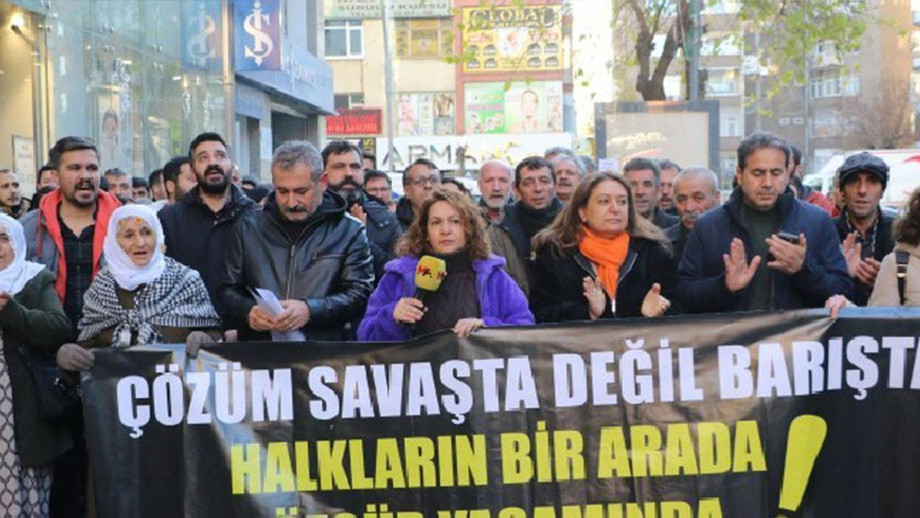Protests have erupted across Turkey against ongoing strikes in North and East Syria (Rojava), with demonstrators criticising government policies for worsening Syria’s crisis. Activists demand democratic dialogue and peace, warning of dire consequences for the entire Middle East.
Protests erupted across Turkey on Saturday against ongoing military strikes in North and East Syria (Rojava), as activists condemned the government’s policies as exacerbating regional instability. Demonstrators from various cities called for an end to the military aggression, saying that peace is the only path forward.
Amed Labour and Democracy Platform gathered in Diyarbakır (Amed) outside the city’s AZC Plaza business centre to decry Turkey’s involvement in the region. Holding banners stating “The solution lies in peace, not war” and chanting “No to war, peace now!” and other slogans, the crowd included representatives from civil society organisations and political parties.
Co-chair of the Diyarbakır branch of the Education and Science Workers’ Union (Eğitim Sen) Saliha Zorlu, urged an end to the conflict. “Wars bring no solutions,” she said. “Peace is the only answer for workers, the unemployed and wider society.”
Faruk Ercan, spokesperson for the Public Employees Union (KESK), stressed the broader implications of Turkey’s policies. “These actions are not only affecting Syria, but destabilising the entire Middle East. For over a century, the region has suffered from crisis-driven systems imposed after World War I,” Ercan stated. He accused the government of collaborating with jihadist groups through the Syrian National Army (SNA), further undermining peace efforts.
The People’s Equality and Democracy (DEM) Party held a similar protest outside its provincial headquarters in İzmir. Branch Co-chair Aysel Önen criticised the targeting of North and East Syria, calling it a threat to the future of all Syrians. “Rojava’s model of coexistence is a solution to the crises of the Middle East,” Önen said. “Defending Rojava is a global responsibility. We urge the international community to speak out.”
Further protests took place in Muş (Mûş), led by the DEM Party and the Free Women’s Movement (TJA). Activists highlighted the Kurdish population’s right to self-determination. The DEM Party’s Muş branch co-chair Yafes Dinar denounced support for paramilitary groups who target Kurdish achievements. “The attacks are intended to dismantle Rojava’s autonomous system,” Dinar said, while TJA representative Hatice Şeker described the strikes as being attacks on democracy itself.
In Ankara, the DEM Party’s Ankara branch co-chair Tatlıgül Gül stressed the urgent need for democratic dialogue. “Amid ongoing conflict, Rojava is under attack,” she stated. “These strikes are worsening Syria’s crisis and obstructing any chance of resolution.”
Protesters across Turkey called for the international community to take action. “This is not just about Rojava; it’s about the future of all peoples in Syria,” said one demonstrator in Diyarbakır. The rallies concluded with chants and applause, echoing a collective demand for peace and justice.


